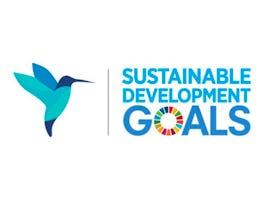The Business School at the University of Colorado Denver wants to help you become a change agent for sustainable business. We hope that with the skills and concepts you gain from this specialization that you will help your business reduce its social and environmental impact. Being a change agent is hard. It takes courage and passion and knowledge. To implement change also requires being able to make the case for that change in terms that people in your company or organization respond to and understand.



First Steps in Making the Business Case for Sustainability
This course is part of Become a Sustainable Business Change Agent Specialization

Instructor: John Byrd
Sponsored by EdgePoint Software
15,171 already enrolled
(200 reviews)
Skills you'll gain
- Cost Benefit Analysis
- Corporate Accounting
- Corporate Sustainability
- Environmental Social And Corporate Governance (ESG)
- Corporate Strategy
- Financial Management
- Organizational Strategy
- Strategic Planning
- General Accounting
- Finance
- General Finance
- Strategic Thinking
- Management Accounting
- Systems Thinking
- Financial Analysis
- Business Strategy
Details to know

Add to your LinkedIn profile
5 assignments
See how employees at top companies are mastering in-demand skills

Build your subject-matter expertise
- Learn new concepts from industry experts
- Gain a foundational understanding of a subject or tool
- Develop job-relevant skills with hands-on projects
- Earn a shareable career certificate


Earn a career certificate
Add this credential to your LinkedIn profile, resume, or CV
Share it on social media and in your performance review

There are 5 modules in this course
Welcome to the first class of Become a Sustainable Business Change Agent. This week we introduce you to several people who are making changes and talk about the class and the entire specialization. We also begin to think about what type of changes you should look for at the start of your change agent career. Finally, we discuss what a good proposal has to do to be approved. The proposal has to convince decision-makers that your change helps the company or organization. So you need to make sure that the right people support your idea, that the right person receives it and that you have made a sound case for the sustainability change you are proposing. During the next classes we will help you learn the tools to put together a powerful proposal and to identify the key people who will influence your idea being implemented. We hope by the end of this specialization you will have a proposal for a change in your company, or have the tools so when that opportunity arises you can be an agent of positive change.
What's included
5 videos1 reading1 assignment2 discussion prompts
This week we discuss what you should be trying to accomplish with your first sustainability change project and give you some ideas of the types of projects that are likely to be successful. We also introduce the notion of establishing a baseline so you can measure the effect of your change.
What's included
7 videos1 assignment1 peer review1 discussion prompt
An important aspect of making the business case of change is to show the likely financial impact of the change. Ideally, we will find improvements that increase profits either by saving the company money or by increasing sales. To demonstrate these financial benefits we use a standard tool from financial analysis - Net Present Value analysis (NPV). The idea underlying Net Present Value analysis is that we estimate all the cash inflows and outlays associated with a project, then through a technique called discounting (or computing the present value) we shift all the cash flows into the present so they can be compared. You cannot compare an outlay made to day directly to a cash flow or profit to be received in two or three years. Combining the present value of the cash flows - adding the present value of benefits and subtracting the present value of outlays - gives us the Net Present Value. If the NPV is positive the benefits, adjusted for time, more than offset the costs and the project enhances the value of the company. If the NPV is negative then the monetary benefits do not more than offset the costs. But there may be non-monetary reasons for pursuing the project. This is where we begin to consider the reasons for companies becoming sustainable discussed in Week 2 of this module. The business case includes the financial impact and non-monetary sustainability impacts of the change.
What's included
4 videos2 readings1 assignment1 peer review1 discussion prompt
In this module we cover two topics: The benefits for companies of being sustainable and aspects of our economic system that prevent/discourage companies form being more sustainable. The goal of the module is to give you the first tools for making the business case for sustainability. The benefits of sustainability will be important as you put together your proposal for change. If you work in the sustainable business arena very long you will need to know some of the vocabulary and economics that cause some of our environmental and social problems. These are market failures. We'll introduce three: externalities, common access resource problems and information failures.
What's included
4 videos3 readings1 assignment1 peer review2 discussion prompts
The Business School at the University of Colorado Denver wants to help you become a change agent for sustainable business. We hope that with the skills and concepts you gain from this specialization that you will help your business reduce its social and environmental impact. Being a change agent is hard. It takes courage and passion and knowledge. To implement change also requires being able to make the case for that change in terms that people in your company or organization respond to and understand. We begin our journey to being a change agent by introducing sustainability thinking. Sustainable business requires a new way of seeing and thinking about how business operates. By beginning to think sustainably you will be better able to identify ways that your company can improve and explain those changes to decision makers. We will look at 6 ways of thinking related to sustainability: • Life-Cycle Thinking • Long-Term Thinking • Circular Thinking • Resilience Thinking • Systems Thinking • Context Thinking
What's included
8 videos1 reading1 assignment2 peer reviews1 discussion prompt
Instructor

Offered by
Why people choose Coursera for their career




Learner reviews
200 reviews
- 5 stars
76%
- 4 stars
19.50%
- 3 stars
2%
- 2 stars
1%
- 1 star
1.50%
Showing 3 of 200
Reviewed on Mar 15, 2021
I really enjoy this first course, I'm alredy doing the second of this specialization. Thank you for offer such good education!
Reviewed on Sep 7, 2019
The course is both interesting and useful. The peer-graded assignment system rather tricky though.
Reviewed on Feb 13, 2021
Good course content. Good beginner course on management skills and decision making for sustainability and management practices
Recommended if you're interested in Business

University of Colorado Boulder

Erasmus University Rotterdam

University of Colorado Boulder

University of Illinois Urbana-Champaign

Open new doors with Coursera Plus
Unlimited access to 10,000+ world-class courses, hands-on projects, and job-ready certificate programs - all included in your subscription
Advance your career with an online degree
Earn a degree from world-class universities - 100% online
Join over 3,400 global companies that choose Coursera for Business
Upskill your employees to excel in the digital economy


